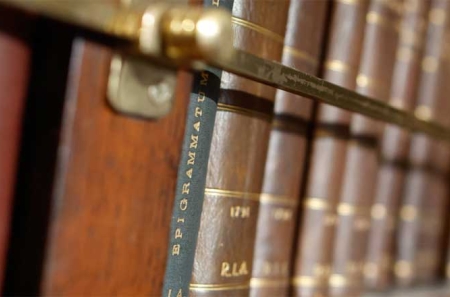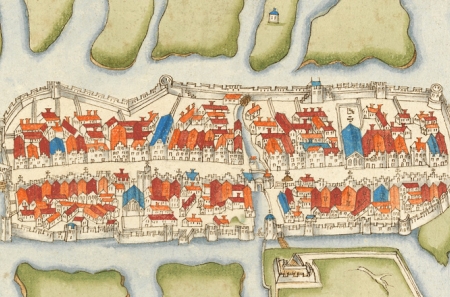The future of cross-border cooperation in the arts – What next?
When
Friday, March 3, 2023, 10:30 - 14:30Where
Tickets
Panel discussions to build on the 2022 ARINS report
Building on the 2022 ARINS report recommendations, the recent Shared Island Dialogue (Belfast, October 2022) and the announcement of Shared Island funding for both Local Authorities and a range of collaborative projects, this event brings stakeholders and the sector together to have an informed and incisive debate on the future of cross-border cooperation in the arts – what next?
See panellists' bios below or download the full programme
10:55 Welcome - Mary Canning (President Royal Irish Academy)
Introduction - Daniel Carey (University of Galway)
11:10 – 12:00 Panel 1: What do we need to know?
CHAIR: Eugene Downes (Department of Foreign Affairs)
Angela Dorgan (First Music Contact)
Aoife McGrath (Queen’s University Belfast)
Victoria Durrer (University College Dublin)
Karly Greene (ACNI)
12:00 – 12:00 Questions from the floor
COFFEE
12:30 – 1:20 Panel 2: What do we need to do?
CHAIR: Steven Hadley (Trinity College Dublin)
Jimmy Fay (Lyric Theatre Belfast)
Cian Smyth (University of Ulster)
Gina O'Kelly (Irish Museums Association)
Davide Terlingo (The Arts Council)
1:20 – 1:30 Questions from the floor
LUNCH
2:30 CLOSE
You may like to take a look at the report or listen to a podcast with Steven Hadley, in discussion with Darren Ferguson and host Rory Montgomery MRIA on the topic.
Speakers' bios
Daniel Carey is chair of the Irish Research Council and is the Royal Irish Academy's Secretary for Humanities and Social Sciences. He is director of the Moore Institute for the Humanities and Social Studies at the University of Galway. With Steven Hadley, he is author of the article ‘Ireland’s creative and cultural industries: policies, evidence, and research possibilities’ (2021).
Eugene Downes joined the Irish Diplomatic Service in 1994 and worked at HQ in Dublin on the peace process, and then as cultural attaché in Moscow, before moving into the performing arts. He presented on RTÉ Lyric FM from 1999 to 2001, and from 2000 to 2007 he worked as cultural adviser to the Department of Foreign Affairs (DFA) and the Office of the President of Ireland, curating and producing the artistic programme for more than twenty state and official visits and major events. He acted as MC of the EU Enlargement Ceremony held in Dublin to welcome ten new member states on the ‘Day of Welcomes’, 1 May 2004. Eugene served as the first chief executive of Culture Ireland from 2007 to 2012, and between 2013 and 2018 as artistic and executive director of Kilkenny Arts Festival, Ireland’s oldest multidisciplinary international festival. In 2019 he returned to DFA in the newly created role of cultural director, with responsibility for the fields of cultural diplomacy and cultural relations.
Angela Dorgan is the CEO of www.firstmusiccontact.com (FMC), the Arts Council-funded national resource organisation for musicians. FMC runs the Irish Music Export Office (www.musicfromireland.org), the online music portal www.breakingtunes.com and the annual music industry showcase, Ireland Music Week (www.irelandmusicweek.com). FMC has recently established an association of independent music, AIM Ireland. Angela is vice-president of EMEE, the European Music Exporters’ Exchange, where she was part of a group that devised a global music export strategy for European music for the European Commission. She provides mentoring support to music and export offices around the world. Angela recently stepped down as chair of the National Campaign for the Arts, which lobbies government for increased support, funding and recognition of artists, arts workers and arts organisations in Ireland. During her time as chair, she was instrumental in lobbying for the pilot scheme for a Basic Income for Artists, as well as lobbying government for increased funding for the arts and entertainment sector during the Covid-19 crisis. Angela has a Masters’ Degree in Sociology from UCC and believes that arts and culture are an essential part of the life of every citizen. She is a regular contributor and expert voice on music and arts in the Irish media and is a member of the WH Olgivy Culture Collective.
Aoife McGrath is a dance practitioner-scholar and senior lecturer in Drama at Queen’s University Belfast. Her research spans dance scholarship, practice and policy, and she is interested in how embodied knowledge can be integrated into policy and strategy decision-making processes. She curated the first all-island, cross-border dance industry and research conference in 2019 and is Co-Principal Investigator, with Victoria Durrer (UCD), on mixed methods, cross-border projects funded by the Higher Education Authority North–South Programme and the Cooperation with Northern Ireland funding scheme.
Victoria Durrer is Ad Astra research fellow in Cultural Policy at UCD and co-founder of Cultural Policy Observatory Ireland. She recently led an Irish Research Council-funded research project examining interconnections in the policy and practice of dance and theatre on the island of ireland. With Aoife McGrath (QUB), she is co-recipient of a Higher Education Authority North–South Programme grant to understand the dynamics of youth dance on the island. A social scientist, her work focuses on how the interaction of administration and policy both shape and are challenged by artistic practice as social, cultural and professional endeavours.
Karly Greene is the director of strategic development and partnerships at the Arts Council NI, responsible for developing the Arts Council’s strategic, corporate and business plans and for research, policy and advocacy. She also has responsibility for ensuring the Arts Council meets its statutory requirements in relation to equality and inter-agency co-operation with other government departments and local authorities. Karly has over twelve years’ experience across the public, private and voluntary sectors in using research and data to inform strategy, policy and executive decision making. She is passionate about using research insights to implement change with a focus on equality, social justice and involving users and underrepresented people in the strategy design process. She is a trustee on the board of Housing Rights and former chairperson of Nexus NI.
Steven Hadley is an academic, consultant and researcher working internationally in arts management, cultural policy and audience engagement. He is currently a research fellow at Trinity College Dublin and a visiting lecturer at Leuphana University of Lüneburg (Germany). He previously held research posts at the universities of Galway, Sheffield, Hull and King’s College London. Steven is an associate consultant with both The Audience Agency and Counterculture and sits on the steering committee of the Cultural Research Network and the editorial board of Arts and the Market. He is policy and reviews editor for Cultural Trends. Steven has lectured, taught and delivered training in over thirty countries globally and works as a consultant for a wide range of cultural organisations. His recent published work has focussed on cultural democracy and audience engagement. His book, Audience development and cultural policy, is published by Palgrave MacMillan.
Jimmy Fay was born in Manitoba and raised in Tallaght. He is the executive producer and artistic director of the Lyric Theatre in Belfast, where he now lives. He is a former acting literary director of the Abbey Theatre, where he was also an associate director and staff director. He formed his own company, Bedrock Productions, in 1993, which he ran until 2010. He co-founded the Dublin Fringe Festival in 1995 and was its first director in 1995 and 1996. His directing credits include Blasted by Sarah Kane, Faraway by Caryl Churchill, East by Stephen Berkoff, Night just before the forest, Quay west and Roberto Zucco by Bernard Marie Koltes, and This is our youth by Kenneth Lonergan; he curated Electroshock, a Theatre of Cruelty Season, all for Bedrock at the Project Arts Centre. He has also directed Pentecost by Stewart Parker, Double cross by Tom Kilroy, Here comes the night by Rosemary Jenkinson and St Joan by George Bernard Shaw. He won The Irish Times Directors Award in 2007. The Lyric won The Stage’s Theatre of the Year, 2023. Jimmy serves on the board of the Tyrone Guthrie Centre, a retreat for artists in Annaghmakerrig, Co. Monaghan.
Cian Smyth has commissioned or produced work across disciplines—with artists including Jeremy Deller, Suzanne Lacy and Compagnie XY; on collaborations including with Sadler’s Wells, John Peel Archive and Artichoke; and advising or delivering programming for the London 2012 Ceremonies and Festival, Hull UK City of Culture 2017, the BBC and 14-18 NOW. His career began as bookseller and art department buyer at Hodges Figgis in Dublin, and he then worked at various film festivals and at the UK Film Council during the formative years of Northern Ireland Screen. He is a former board member of the Arts Council of Northern Ireland (2015–20), chairman of Outburst Arts (2013–20) and is a fellow of the Royal Society of the Arts. Cian continues to advise on nationwide and international cultural programmes while directing an arts programme for Ulster University.
Gina O'Kelly leads the all-island Irish Museums Association (IMA) and is a board member of Visual Artists Ireland and Encountering the Arts Ireland. She contributes to cross-border expert advisory groups (including Digital Repository Ireland, National Museums Wales’ Cultural Rights & Democracy) and is external PhD supervisor for ‘The EU and the museum: cross-border activity in Ireland’ (Ulster University).
Davide Terlingo works at The Arts Council | An Chomhairle Ealaíon as head of International Arts. In this role, he is responsible for managing national budgets and funding programmes, developing partnerships and advising on national policy. Other roles at the Arts Council have included the management of the Dance, Festivals, Circus, Street Arts and Spectacle portfolios. Prior to joining the Arts Council he lived in several EU countries, working on numerous arts projects and cultural initiatives in a variety of roles. While in Ireland, he created an innovative cultural programme in Limerick, which included national and international collaborations. He was also the founder/director of the Mamuska Network (spanning ten cities across five EU countries and Japan).




